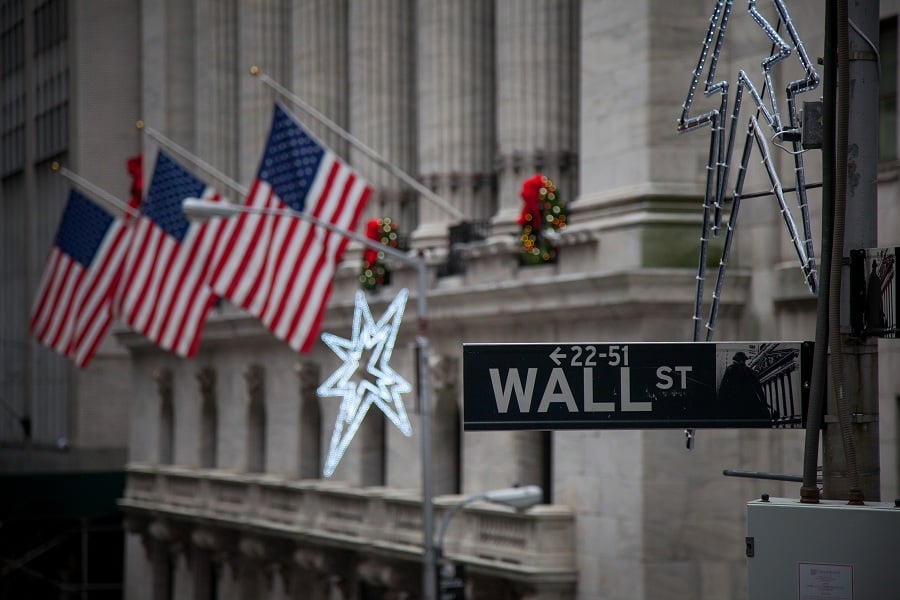Signs of distress in financial markets are gathering force as concern over the state of the global economy deepens.
Signs of distress in financial markets accumulated amid deepening concern over the health of the global economy, sending the Dow Jones Industrial Average more than 300 points lower.
The Standard & Poor's 500 Index headed for its lowest close in 22 months, as U.S. shares joined a retreat in European and emerging-market stocks. Investors sought the safest assets, sending yields on Treasury 10-year notes to the lowest level in a year, and those on Germany's 10-year bunds to the lowest since April. Meanwhile, yields on bonds of Europe's most-indebted countries rose, while the cost of protecting against default by U.S. junk-rated companies climbed to the highest since 2012. Oil slid under $30 a barrel and spot gold advanced for a seventh day, the longest winning streak since March.
http://www.investmentnews.com/wp-content/uploads/assets/graphics src="/wp-content/uploads2016/02/CI10377328.JPG"
“We're still seeing selling pressure from the tech valuation resetting last week, as well as the drop in oil,” said Matt Maley, an equity strategist at Miller Tabak & Co LLC in New York. “But it's not just a problem with technology and some of the high-flyers that have rolled over in recent days, but also the recent stresses in the credit markets.”
U.S. stocks sank last week, as concern about everything from China to oil and interest rates spurred strategists to lower their year-end projections for equities. In Europe, data today showed the Sentix investor confidence index dropped to the lowest in more than a year in February. Oil failed to hold gains after Saudi Arabia held talks Sunday with Venezuela, which is trying to drum up support for a coordinated oil-output cut to buttress prices. Most Asian markets were closed for the lunar New Year holidays.
STOCKS
The S&P 500 fell 2.6% at 1:55 p.m. in New York, as financial and material companies led losses. The Nasdaq 100 Index slid for a fifth day, headed for the lowest close since October 2014. The Nasdaq Composite Index has tumbled more than 19% from a July record, on the precipice of a bear market.
Shares of Chesapeake Energy Corp. plummeted 34% after a report that it hired a restructuring law firm. Bank of America Corp. dropped 6%.
The S&P 500 declined last week for the first time in three, with a jobs-day tumble on Friday turning into a full-blown selloff. A rout in high-valued software and Internet companies continued Monday with Facebook Inc. falling 5.6% today after its steepest retreat in more than a year.
While the S&P 500's valuation of 15.3 times forecast earnings is in line with the average of the past five years, the measure has plunged 12% since the start of the year. The gauge remains more expensive than developed markets in Europe, where the Stoxx Europe 600 Index trades for 13.8 times estimated earnings.
The Stoxx 600 slid for a sixth day, declining 3.5% to the lowest since 2014. Equity benchmarks in Germany, France and Spain dropped at least 3.2%. Greece's ASE Index sank 7.9% to the lowest since 1990 as banks tumbled.
EMERGING MARKETS
The MSCI Emerging Markets Index fell 1%, extending last week's decline. Benchmark gauges in Russia, Turkey and Poland slid at least 1.2% while India's Sensex dropped 1.3%.
Markets closed today include those in China, Hong Kong, Indonesia, Malaysia, the Philippines, Singapore, South Korea, Taiwan, Brazil and Argentina.
China reported Sunday its foreign-exchange reserves shrank $99.5 billion in January to $3.23 trillion, the smallest level since 2012.
BONDS
Treasuries climbed, as they continued to benefit from speculation a weaker global and domestic economy will delay an interest-rate increase by the Federal Reserve. Yields on 10-year Treasury notes fell ten basis points, or 0.1 percentage point, to 1.74%.
The risk premium on the Markit CDX North American High Yield Index, a credit-default swaps benchmark tied to the debt of 100 junk-rated companies, surged as much as 24.9 basis points to 575 basis points, the highest level since 2012.
Germany's government bonds advanced, pushing the two-year yield to the lowest on record. Meanwhile, Portugal led a drop in the bonds of Europe's higher debt and deficit nations.
Germany's two-year note yield touched minus 0.519%, the lowest since Bloomberg began compiling the data in 1990. Portugal's 10-year bond yield rose 25 basis points to 3.36%, the highest since October 2014.
The Markit iTraxx Europe Senior Financial Index of credit-default swaps rose 17 basis points to 138.39 basis points. An index of swaps tied to junk-rated companies increased for a sixth day, the longest run since October 2014. A gauge of investment-grade swaps rose 12 basis points to 122.66 basis points. All three indexes are at the highest since 2013.
COMMODITIES
Oil fell for a third day after no supply agreement emerged from Venezuela's tour of crude-producing nations. Saudi Arabian Oil Minister Ali al-Naimi met his Venezuelan counterpart Sunday in Riyadh, the Middle East nation's Petroleum Ministry said in a statement, without mentioning any steps to shore up the market.
West Texas Intermediate crude dropped 3.1% to $29.92 a barrel and Brent slid 2.1% to $33.36.
“The Saudis are the main obstacle to a cut,” said Ole Hansen, head of commodity strategy at Saxo Bank A/S. “They are buying time while we wait for the solid proof that U.S. production is slowing.”
Gold climbed 2.1% to $1,198.57 an ounce, the highest level since June. Silver jumped 2.9% to the highest level since October. Copper dropped 0.2%, while zinc and lead advanced amid signs of tightening supplies.
.







